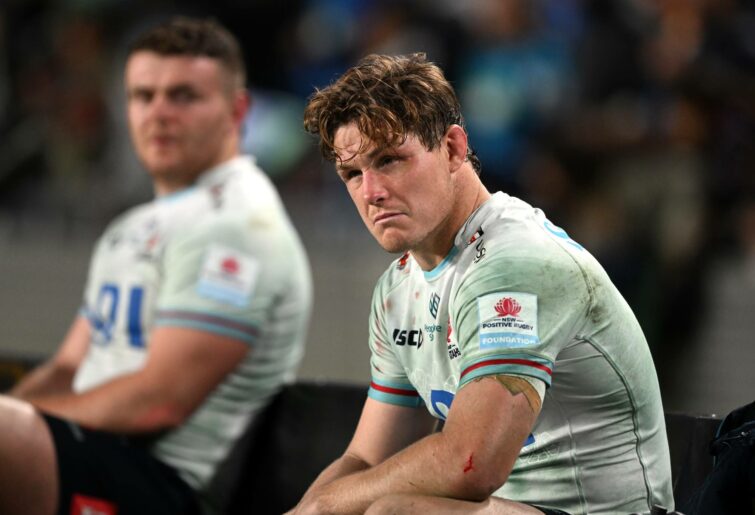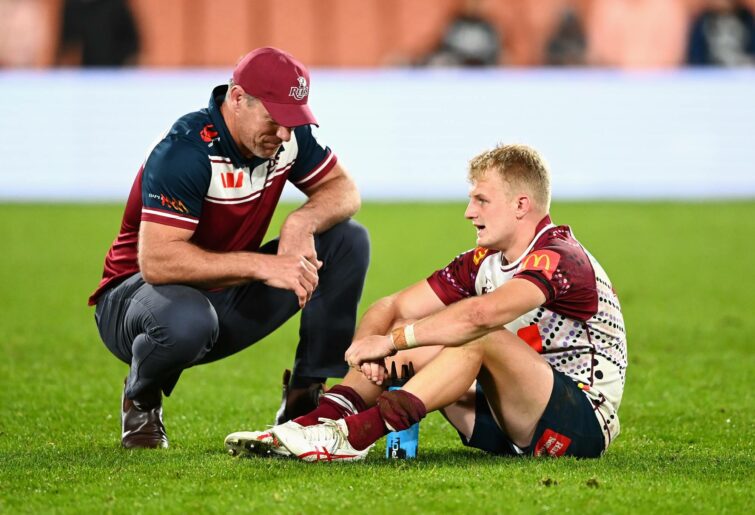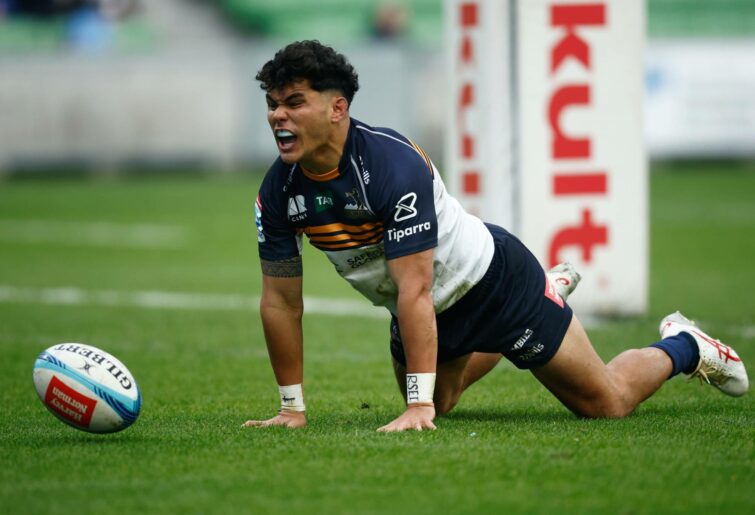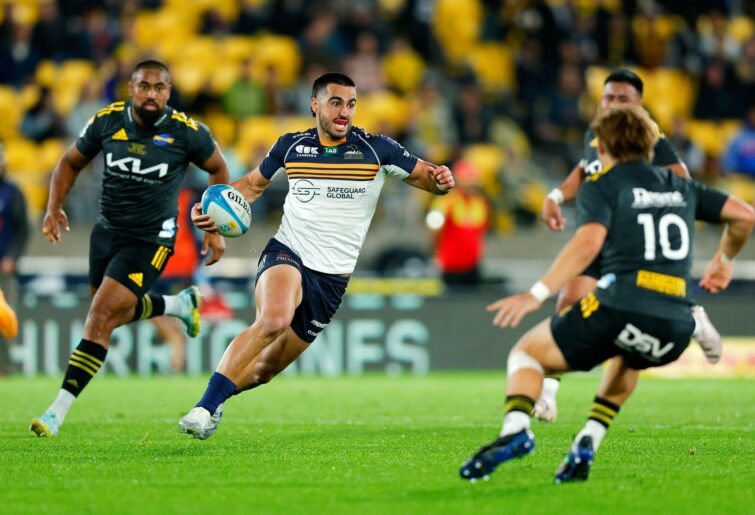And then there were four. Which feels a tad harsh on the Hurricanes, because all season there have been five teams head and shoulders above the rest.
But in a classic game of musical chairs, when the music stopped on Saturday night and Ardie Savea and Luke Reimer dived for the same chair, there was always going to be one disappointed loser. Five into four simply doesn’t go.
More on the tense, dramatic finish in Canberra later, but Super Rugby’s much-maligned finals system has not only delivered the four best teams into the semi-finals, and the prospect of two great contests next weekend, but on the way, given us two outstanding quarter-finals.
Things started predictably enough on Friday night; that is, if there is anything predictable about rangy Ned Hanigan sticking out his big right mitt and galloping away to score the opening try at Eden Park.
It should have been two scores for the visitors, but Dylan Pietsch will already be sick of people reminding him to carry the ball in the outside hand. And hold onto it a bit tighter too, while you’re at it.
The Blues seemed reluctant early to engage the Waratahs in contact, but once they embraced the physical contest, they were all the better for it; the next 38 points killing off the contest. At 38-12, electing to kick a penalty right on full-time was either a kind application of the mercy rule, a sign of respect for the visitors, or an illustration they were already thinking about seat allocation for the flight down to Christchurch.
This was one of those matches where you’re never quite sure how good the winner was. Ill-discipline from the Waratahs meant that the Blues never had to earn their exits the hard way, and Michael Hooper’s final appearance for his franchise fizzled out as a result; Hooper looking a bit detached from proceedings, on and off the field, as if the happy memories of 2014 had long since faded to black.

(Photo by Hannah Peters/Getty Images)
If the first semi-final followed a predictable script, the second one certainly didn’t, with the Reds coming within a whisker of causing a colossal upset, falling 29-20 to a late try to the Chiefs’ 48-year-old-looking 28-year-old, Pita Gus Sowakula.
For all of the criticism thrown at Brad Thorn during his tenure with the Reds, one thing he and his side have always prided themselves on is their ability to scrap hard and stay in contests. So was the case here, with the Reds at times troubled by the Chiefs’ long-kicking game, and running threat from the back, but accumulating points from their own opportunities; essentially giving as good as they got.
There was skill; two terrific early passes from Harry Wilson and James O’Connor, and a freakish 50/22 kick from Tom Lynagh. And there was sheer determination; a Josh Flook try-saving tackle on Emoni Narawa a notable stand-out.
But it was the Reds’ ability to reset quickly in their defensive line that had them right in the game. On the few occasions the Chiefs were able to bust into the backfield, even with quick ball, the Reds still presented a solid line in defence. One that took until the 75th minute to break down.
For all the Reds’ heroics, the Chiefs won because some of their old heads dug deep; Brodie Retallick in particular stepping up when the game needed to be won. There was never a sense of panic too, which is something all great sides have; the ability to stay focused and clear-headed, and execute on core skills, no matter the ticking clock.
With the Reds leading deep into the final quarter, the rising tension was palpable. If New Plymouth was a huge upset, a repeat here, 1 versus 8, with nobody resting players for this reason or that, would have been stratospheric.
In the end it didn’t happen, but the fact that it could have happened, and almost happened, was enough to put many of the doubts about the competition to rest.

(Photo by Hannah Peters/Getty Images)
Yes, teams from the bottom half of the ladder can beat teams at the top of the ladder. A lot of things have to go right, sure. But what this match showed is that there are enough good players spread around all of the Australian sides to trouble and match their New Zealand counterparts; if they are prepared to turn up on the day, commit 100 per cent to the game plan, and deliver with relentless intensity; individually and collectively.
Ironically, if the Reds had got up to win, the argument against the final eight format would have been tipped right on its head; complaints shifting from a lack of competitiveness, to the unfairness of the top seed being turfed out in Week 1!
Fijian Drua coach Mick Byrne spoke beforehand about his side entering their quarter-final worrying less about the Crusaders and more about executing their own game. Five minutes and a couple of dud kicks later, their game plan was in tatters, the score 14-0 against, and the contest effectively killed off before it had even started.
The Crusaders would run out of players before the final quarter, finishing with only 13 able bodies, but it didn’t matter a jot. 45-8 was a fair account of the difference.
Concerningly, one of the wounded was Ethan Blackadder, and once the jokes about him emulating Quade Cooper’s run on-run off so as to qualify for a Japanese final fade away, there will be fingers and legs crossed in Christchurch that Blackadder – and a few of his injured mates – can find a way back before the season is done.
If you’re anything like me on the tooth, you like to save the best mouthfuls for last, in which case you will have been amply rewarded by the dramatic finish to the last quarter-final, won long after the final siren by the Brumbies, 37-33.
In truth, the match was won in the first half, when the Brumbies clinically took advantage of some passive and disconnected defence by the visitors to score three quick tries.
On the other side of the ball, save for two glaring exceptions in the case of tries to Kini Naholo and Devan Flanders, the Brumbies’ defence was much more ‘finals-like’; assertive and accurate, often accompanied by well-chosen moments of disruption to the Hurricanes’ recycle.
Whereas the Hamilton match had an epic feel because of its ‘David versus Goliath’ element, this was more like what you’d expect from a fourth versus fifth dog-fight; two evenly matched sides scrapping for every metre, variously enjoying little periods of dominance, before turning it back to their opponent.
The final opportunity fell to the visitors, but because Noah Lolesio had drilled a side-line conversion to Tom Wright’s 71st-minute try, the Hurricanes needed to win with a try, not a penalty goal or drop goal. With Jack Debreczeni in good touch, Lolesio has become a kind of forgotten man, but even so, his was a telling contribution.

(Photo by Daniel Pockett/Getty Images)
While it was Luke Reimer who took the chocolates for his final effort, this was an impressive team effort, repeatedly coming off their goal-line with purpose, showing the Hurricanes how they should have handled things in the first half.
Whatever one’s view on the final grounding, one thing that can’t be disputed is that Nic Berry got his call exactly right. Referees can’t award tries they haven’t seen.
As it turns out, neither can the TMO, and without conclusive evidence to support Savea’s contention that he had scored, Brett Cronan had no choice but to throw his hat in with Berry.
Hurricanes supporters might feel aggrieved that once Berry sent it upstairs as no try, the burden of proof was weighed too heavily against them. But even if the referee’s ‘soft signal’ didn’t apply, and it was left to the TMO to make his own judgment independent of the other match officials, it’s hard to imagine, on the murky evidence provided, Cronan coming to any different decision.
With respect to the looming World Cup, this match threw up four truths; two for the Wallabies, and two for the All Blacks.
As dangerous as ever in attack, Wright again demonstrated why he is a defensive risk at 15. He wasn’t the only one who parted the seas for Flanders on his incredible 60-metre try-scoring run, but World Cup-winning fullbacks make those tackles every time. Wright’s rap sheet at the back, in one-on-one situations, is now too long to ignore.
Nothing new, but Rob Valetini’s value to the Wallabies as an abrasive ball-runner and defensive rock cannot be understated. As the heat was turned up the second half, Valetini knuckled down and lifted his work-rate, his defensive shoulders granite-like.
Eddie Jones needs all his best players on the field, but Valetini is the individual he can least afford to lose.
After spending the last couple of years settling arguments about his suitability at 12, Jordie Barrett raised plenty of concerns, too easily becoming disconnected in defence for two Brumbies tries, in a way that will have French, South African and Irish centres salivating.
To cap things off, Savea’s ‘did he, or didn’t he?’ moment wouldn’t have happened had Barrett not ignored an unmarked Bailyn Sullivan outside him. File under: not terminal but grounds for concern.
After making impressive strides this year, the robust Cam Roigard continues to mature, and he had another fine match. He now stands – clearly – ahead of Folau Fakatava, Finlay Christie and Brad Weber, in the All Blacks’ pecking order at halfback and needs time in the saddle during the Rugby Championships.
Yes, there was only a fingernail preventing Australia signing out of Super Rugby before the semi-finals, but the competition is far the richer for the Brumbies travelling to Hamilton next weekend; not because they are Australian and provide some geographic balance, but because they deserve to be there, and because they have a realistic winning chance.

(Photo by Hagen Hopkins/Getty Images)
Not for the first time, Super Rugby has found a way to overcome its own shortcomings; a way to hit back against the knockers, by delivering compelling, intense, finals football. And there’s nothing to suggest that this week’s semi-finals, in Christchurch and Hamilton, will be any less thrilling.
Given the Brumbies and Reds’ efforts this weekend, it seems even more ridiculous than ever to believe that the path forward for Australian rugby is to retreat to a domestic competition, all in the name of being assured a local winner.
This isn’t the domestic landscape of AFL and NRL. In a global sport, ‘play the best, beat the best, be the best’ must be the way forward.
The riders are that the proposed Super Rugby independent commission is allowed its head; so that many of the frustrations and impediments around the competition are addressed.
And that Rugby Australia supports its franchises by providing a high-performance pathway that doesn’t continue to set its players at a competitive disadvantage come every January.
Both of those are no-brainers. At this stage, both feel like they are at longer odds than they should be.
































































































